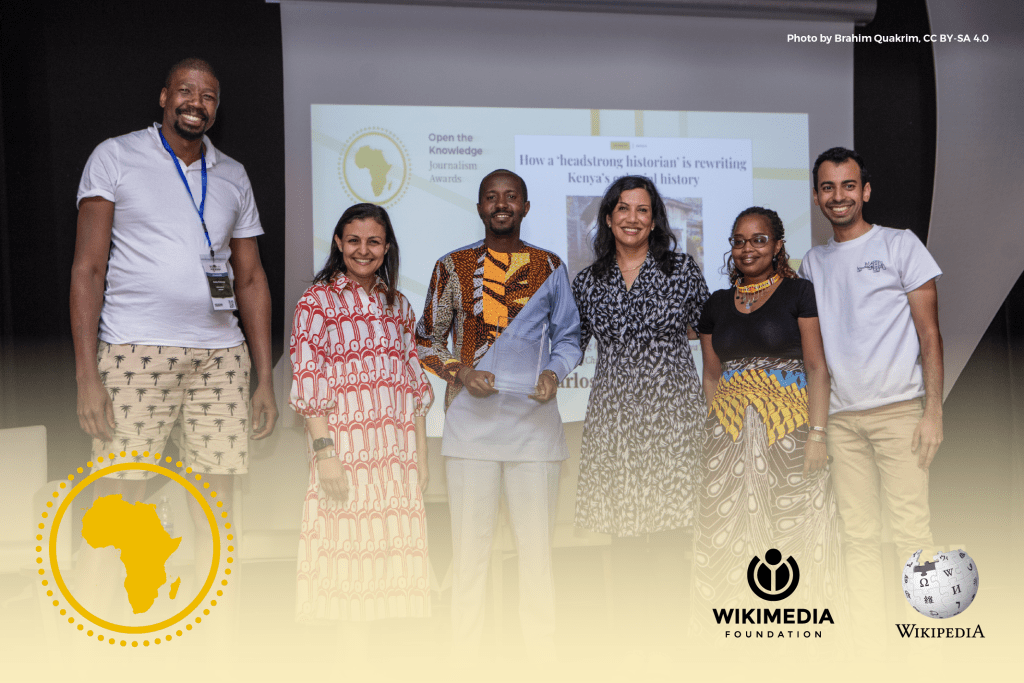
Awardees of the inaugural Open the Knowledge Journalism Awards have been unveiled today and celebrated during the 7th edition of Wiki Indaba (3-5 November) in Morocco.
The Open the Knowledge Journalism Awards, which the Wikimedia Foundation launched on 3 May 2023, aims to celebrate the essential role journalists play in creating well-researched articles that volunteer editors can use as source materials to develop content on Wikipedia and other Wikimedia projects. Their work helps to grow the knowledge base on one of the world’s most visited websites.
Between 3 May to 30 June, African journalists living on the continent were invited to self-nominate articles they had written that help expand knowledge about Africa under the following categories: Arts, Culture, Heritage, and Sports; Digital and Human Rights; Health, Climate Change, and Environment; and Women and Youth. Over 2000 submissions were received from 37 African countries.
The award categories were identified in a consultative process with affiliate leaders from the movement in Africa, who identified them as “topics of impact” that communities in the region continue to prioritize in their ongoing efforts to shrink Africa’s content gaps on Wikimedia projects. A good number of African communities have already, through initiatives like the Months of Africa cinema campaign (The Afrocine Project), and others, been working towards improving content and coverage of Africa on Wikipedia. Through the Journalism Awards, we hope to shine a light on reporting that helps close these knowledge gaps and uncovers more of Africa’s history.
Journalist Carlos Mureithi from Kenya has been announced as the first place award recipient for the article “How a ‘headstrong historian’ is rewriting Kenya’s colonial history” published in the Christian Science Monitor in January 2023.
His article profiles Chao Tayiana Maina, a Kenyan historian and Dan David Prize winner who is uncovering buried and overlooked segments of Kenya’s history under the colonial era. The article spotlights her efforts in using technology to help make this information accessible to a wider audience.
According to Carlos, the inspiration to write the article was driven by his deep “passion for Kenyan colonial history, and the realization over the years that a lot of it is hidden or untold”.
He added:
“The article is a profile of Chao Tayiana Maina, a Kenyan historian and digital heritage specialist who uses tech to tackle this problem, effectively deepening knowledge and understanding of the country’s past. The story shows the importance of filling historical gaps and making history accessible to people. This recognition validates my work to tell stories of African changemakers and put their voices on the global stage.”
Second place award recipient
Nigeria’s Osaruonamen Ibizugbe, has been announced as the second place award recipient for her article “FGM: Survivors narrate experiences dealing with absence of the clitoris”, published in the Premium Times in January 2023. It highlights the stories of women who have experienced female genital mutilation (FGM), and details its negative effects. It highlights the voices of women who often go unheard.
“In my quest for answers, and as a Bini girl who works for women’s and girls’ sexual reproductive rights, I was inspired to investigate an area that is sometimes left out of the definition of disability: the removal of certain portions of the female reproductive organs due to FGM. The story documents the coping strategies adopted by survivors in dealing with the consequences of being circumcised, ranging from sexual dissatisfaction, pain, and frigidity in their sexual experiences. I firmly believe that the media is responsible for telling and amplifying African tales to influence narratives through its agenda-setting role. As a result, it is critical for journalists to ensure a more inclusive and balanced portrayal of varied voices and experiences in their media reporting, encouraging greater understanding and societal change in the process. Who will tell our African stories if we don’t?”
Osaruonamen Ibizugbe
Special Mentions
Four other outstanding articles also received Special Mentions in each of the awards four categories, including: Arts, Culture, Heritage, and Sports – Aanu Adeoye (Nigeria), “The Benin Bronzes and the road to restitution“(Financial Times); Digital and Human Rights – Philip Obaje Jr. (Nigeria), “The silencing of Sudan’s journalists – again“, (Al Jazeera Journalism Review); Health, Climate Change, and Environment – Jackson Ambole (Kenya), “How Mombasa’s yoghurt cups powered a reforestation drive“, (Al Jazeera); Women and Youth – Jacqueline Muchazoreka, (Zimbabwe), “The story of how a Zimbabwean woman treated obstetric fistula despite criticism from her church & community” (BellaNaija).
Collaboration
This year’s award categories and recipients were decided upon by the Wikimedia Foundation and a working group of volunteer African Wikimedia editors, as well as a group of external experts from across the fields of media, and academia on the continent. This is the first time the Foundation and communities have collaborated to embark on an initiative of this kind. It is a pilot project, designed for learning. To find out more, please visit the project page on Meta-Wiki.

Can you help us translate this article?
In order for this article to reach as many people as possible we would like your help. Can you translate this article to get the message out?
Start translation